The Lean Approach to Selling Online in China
In conclusion, start selling in China with 2Open in a record time. Most of the actual medium sized cannot, literally, afford to wait for bureaucratic complexities, licenses, or customs.
Europe and China Partner to Provide Mobile Payment Solutions by Alipay
Not quite a month we woke up with the news that two technological giants had joined forces in creating an alliance with huge chance of success. The alliance between Ingenico Group and Alipay is focused on payments innovation as part of a wider international push, but is also a recent demonstration of the growing momentum of Chinese companies in Europe.
Over recent years, Chinese ambitions in Europe are clearly visible: just in 2016, Alipay has forged alliances with Uber app and Wirecard to offer mobile payments services around the World.
The alliance is based in European mobile payments
Ingenico Group is a french company specialized in designing a wide range of payment solutions, whatever the sales channel or payment method is chosen, according to three main needs that merchants and consumer ask: a secure, easy and seamless experience.
In recent years, China has created a vast and well integrated digital ecosystem in which highlights Alipay– a Chinese equivalent to PayPallaunch by Alibaba– which is already China’s leading third-party online payment solution with no transaction fees. The company already has more than 400,000,000 active Users.
 Although there are many reasons behind this alliance, the clear purpose was to tap into the huge Chinese tourist flow in Europe. As we wrote in our previous article “How to Acquire Chinese Tourists through Digital Marketing“, the Chinese tourism consumption is already estimated to be the highest in the World. Moreover, Chinese tourism market will keep growing even faster: in year 2019, estimations says that consumption will reach US 264 billion dollars.
Although there are many reasons behind this alliance, the clear purpose was to tap into the huge Chinese tourist flow in Europe. As we wrote in our previous article “How to Acquire Chinese Tourists through Digital Marketing“, the Chinese tourism consumption is already estimated to be the highest in the World. Moreover, Chinese tourism market will keep growing even faster: in year 2019, estimations says that consumption will reach US 264 billion dollars.
The motivation to exploit the partnership is shared: on the one hand, Europe has become the major vacation destination by a sector of the population with high standard of living; on the other hand, Alipay seeks to exploit the existence of more than 120 million Chinese tourists arriving in Europe every year and an approximately cost of $ 875 on average, while offering a payment experience nearest to their day to day.
Chinese tourists in Europe will be able to pay via Alipay App at any store that uses the Ingenico solution
The announcement not only underscores the growing relationship in business between two increasingly interconnected areas, but also the enormous benefits that such collaboration can mean to both. With such a perspective, it is not surprising the happy ending. As Philippe Lazare, Chief Executive Officer of Ingenico Group said,
“We are very excited to partner with Alipay and contribute our unique omni-channel expertise, products and services to help them optimize the user experience and boost sales all over the world. Their choice for Ingenico is a tribute to our high success rate and ability to meet even the most demanding customers’ requirements.”
 Chinese tourists are accustomed to using electronic payment methods, an innovation that fails to catch on among European citizens. Presumably, this cultural difference has become a barrier that discourages expenditure among Chinese tourists. As Jacques Behr, Ingenico’s executive vice-president for Europe and Africa said,
Chinese tourists are accustomed to using electronic payment methods, an innovation that fails to catch on among European citizens. Presumably, this cultural difference has become a barrier that discourages expenditure among Chinese tourists. As Jacques Behr, Ingenico’s executive vice-president for Europe and Africa said,
“Payment becomes a friction for business so we are removing this friction by allowing the retailers to capture sales to the Chinese tourist population.”
The measure therefore seeks to stimulate Chinese people expenditure in their major holiday destination, but also tries to take advantage of the huge market Alipay already has in China: more than 450 million users liable to become target audience, and a market share in mobile payments in China higher than 80%. As they themselves spelled out,
“We are building international business step by step. There is much still to do with our customer base, and is still expanding.”
Such collaboration not only benefits the Chinese people, but also means a qualitative leap in technological enjoyment for Europeans. The alliance seeks to provide to European online retailers and to customers the possibility to pay and accept payments through Alipay´s eWallet through some marketplaces. An excellent way to boost e-commerce and sales in China and Europe.
Although the operation has already begun, both companies estimate that Alipay won’t be fully operational in Europe yet.
Just to start
While Alipay makes its movements, the rest of the world watches. Only companies that have a deep understanding of Chinese market can cope with the changes that are to come.
In search of accurate and personalized information to your sector and business?
Visit our Digital Marketing and eCommerce Agency!
Sources:
5 Bugs To Avoid When Doing E-Commerce In China
Have you ever tried to build a new overseas brand and fail in your attempt? In any approach to China, foreign brands often make some common mistakes when trying to sell their products in China mainland. Although such misconceptions are not exclusive to online environment, we will focus on those that particularly affect your approach to e-commerce in China. China is already the world’s first e-commerce market.
Are you going to miss its enormous potential?
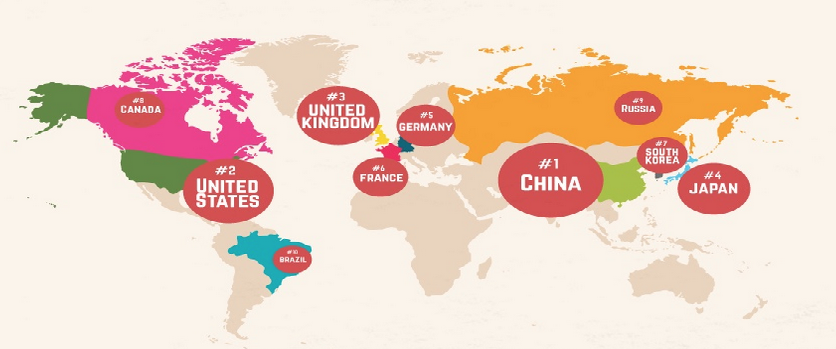
First bug: China is mobile, and you better record it
It is not the first time we tell you this, and for sure it won´t be the last. As we mention before in our article “How to Take Advantage of the Latest Ecommerce Revolution?”, Ecommerce has been a great revolution for both companies and customers.
Nowadays, Chinese prefer to use their mobile devices rather than their laptops and according to the new trend, companies have already starting to adapt themselves to portable devices. Moreover, those companies using U-commerce are focused on improving the customer experience through customizing and navigation created in cooperation with the User.
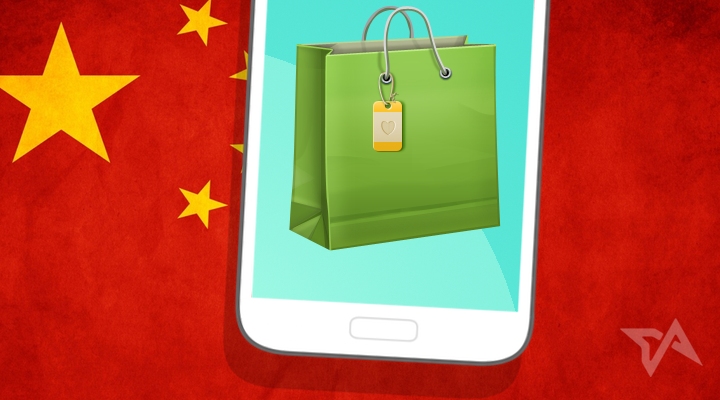
Second bug: E-commerce may be an asset in your country, but in China is irreplaceable
We cannot fail to mention Frank Lavin, CEO of Export Now, when he says,
“In China, Ecommerce is the cake.”
This may mean that you will need to adapt your business to the new environment. Do not expect it to be China who suits you, this does not work this way.
Remember that whoever hits first, hits twice. Embrace e-commerce as the enabler of your business it is, and take advantage of the immense benefits that electronic commerce can bring to your company to start selling around the World!
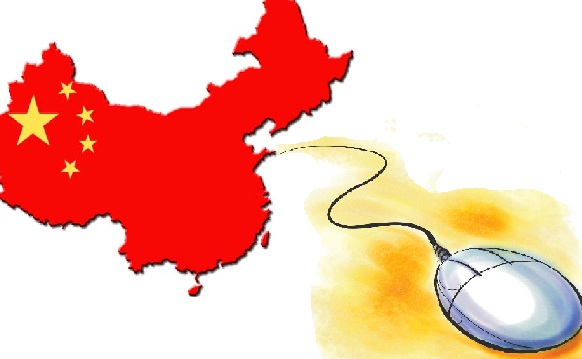
Third bug: Social Media is there to stay. Register your account and start moving!
Surely you’ve never heard the words Baidu, WeChat and Weibo… and let us tell you that you have a huge problem in China.
Not only around the 93% of the online searches in China are done in their own search engines –Have you ever heard Google does not work in China?– but also about a 68% of the customers take a look on the official Social Media account before buying.
Do not miss the opportunity to have a voice in that huge chicken coop is the network, start developing a tailored communication strategy for your brand and gain your piece of the cake!

Fourth bug: Domestic and lazy thinkers, or how the triumph from a day doesn’t make it daily
Do you think you will keep doing in China pretty much the same things you were doing before and as a result you will achieve success?
A basic rule you should never forget again is, no matter the experience and the many different markets in which you have entered before, is that new horizons always implies a new starting on your understanding of the target, so we definitely encourage you to start a market analysis.
Will your brand be competitive in China?
Do you offer something different regarding your competitors?
Is there a suitable market niche in the country ?
These and a thousand more questions require a prior discussion, keeping in mind that China should not be underestimated: the country enjoys some peculiarities you definitely must know before starting your landing.
We strongly recommend you seek assistance from professionals focused on the Chinese market, in order to enhance your chances of success in the country.

Fifth buf: Do not try to do everything by yourself, ask for advice
We are not tired of saying it, and will do so again: China is not a flat road. Do not try to embark on this mission unaccompanied, but pick very well with whom.
Look for complementary partners interested in joining forces, go to Government agencies dedicated to external actions and internationalization and definitely search for specialized agencies in the country to start outsourcing some tasks.

Already in search of a consulting expert in digital marketing and e-commerce? You have come to the right place.

New Online Advertising Rules in China
New online advertising regulation in China will impact all digital business with presence in China. Here we bring you an analysis overview to start adapting to the new trend in advertisement.
It would be after the death of a college student who took part in an experimental health treatment found in Baidu, when popular pressure would force the Government to begin an ads regulatory change.
The Internet Ad Interim Measures, a new regulation prompted by the State Administration for Industry and Commerce of China, went into effect in September 1st. Therefore, it arises from the Government’s claim by adopt new rules over online advertisement: email, paid searches, embedded links, images, and videos are already subject to the new law. Its aim is avoiding the spread of misleading advertisements on the Net, and correct the prevailing liberality so far.
The new online advertising regulations are expected to impact on Chinese Digital Marketing as a whole: social media, search engines, apps and electronic commerce in the country will have to move under the new guidelines.
A step closer to the uses and customs in Western advertisements
For the first time in China, the new measure features a specific definition of Internet advertising; often, foreigners suffer from a lack of legislative safety in China. Therefore, conceptualization is a step forward to define clearly not only the concept, but also its extension:
“Internet advertising is advertisements that directly or indirectly sell commercial goods or services through the websites, web pages, internet applications and other forms of Internet media including text, images, audio, video and etc.”
Moreover, the regulation comes to underline its main purpose:
“To protect the legitimate rights and interests of consumers, and promote the healthy development of the Internet advertising industry.”

In what fields are these changes applicable? What changes will take place after its implementation?
The regulation is particularly focused on a list of fields described below:
-Healthcare and medicine
-Food and beverage
The main measures to be starting to apply can be summarized as:
–First, the Law requires to place the word “advertisement” in a prominent position and clearly distinguishable at first sight.
–Second, every field subject of special regulation needs a previous review and an approval process by authorities.
–Third, online advertisements for prescription medicine is banned. A special measure in health products is also extended to medicines, pesticides or medical supplies.
–Fourth, tobacco online ads are also banned.
–Fifth, any paid search results, links or content must be clearly identified by the word “advertisement”.
–Sixth, users should not only have the choice to close an ad, but also this has to be easy to them.
–Seventh, paid links and contents must be clearly detailed at a glance.
–Eighth, any attached ad and/or promotional links to an email should have been allowed previously.
–Ninth, any misleading and/or false ad is considered illegal from now on.
Who is especially affected by the new regulation?
Under this measure, the biggest impact falls on the largest Internet companies in China. Baidu and Bing should apply new restrictions on ads; it should not be forgotten that, much of the incomes of Baidu, Weibo or Alibaba come advertising.

But also traditional Social Media must change. WeChat or Weibo offer paid content; as we mention before, pop-ups, ads or links should be first permitted, which will force companies to evolve the way advertising is offered to Chinese users. Seems marketers should start creating better ads, or contravening the prevailing legislation with all the penalties that that means.
There are plenty of creative ways to sell your services and products in China. In search of a Digital Marketing Agency?
Infographic: 10 Things You Need To Know To Build a Chinese Website
A picture is worth a thousand words
After the great success achieved by our two articles 10 Things You Need To Know To Build a Chinese Website (I) (II), in the team we have thought it would be a good idea to summarize and turn them into an infographic.
We hope you enjoy it as much as we enjoyed its elaboration 🙂
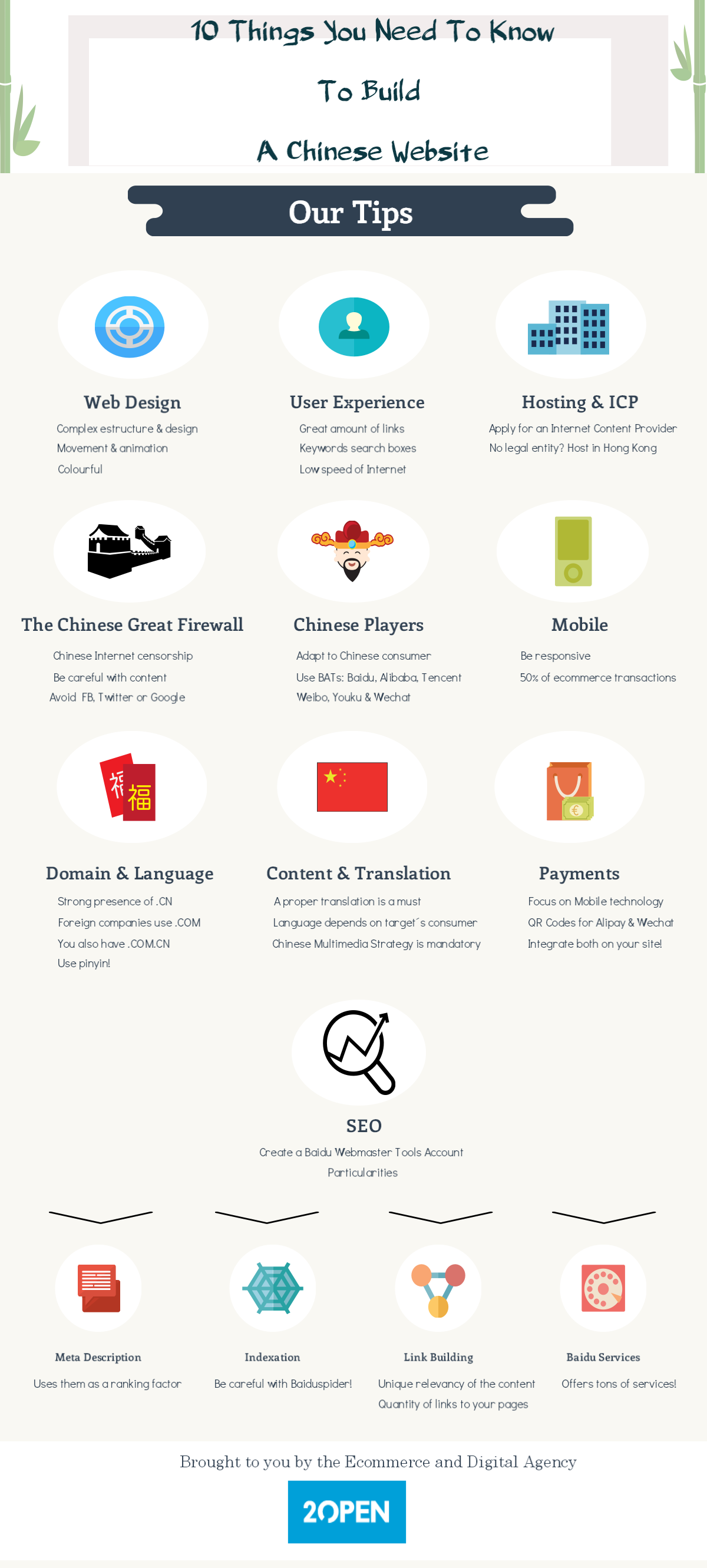
Are you looking for a digital marketing and ecommerce agency?
Visit us. Let´s have a talk!
How to use Tencent Penguin Intelligence in your approach to the Chinese market?
Are you looking for the latest news of Tech innovation in China?
The goal of this article is to shed some lights of why Penguin Intelligence is a work-tool to keep in mind on your approach to China.
Penguin Intelligence is the official data platform from Tencent Technology
Tencent Research Organization works such as a professional organization which publishes in-depth reports about the Chinese mobile ecosystem.
Penguin Intelligence performs research and advocacy concerning hot-topics. It also studies markets, trends and best emerging practices.
Their work is founded on a rigorous thorough understanding of every Industry Focus, Sector Dynamics, Case Studies, Data Analysis and Macro environment.
Penguin Intelligence is constantly optimizing the analytical model
Penguin Intelligence is your best choice if you want to figure out what is happening in Chinese Internet Industry. Unfortunately, their business analysis and reports are only available in Chinese for the moment.
Penguin Intelligence also counts with three original sub-columns:
- Penguin Investigation
- Penguin Analysis
- Penguin Portfolio
In addition, Penguin Intelligence includes an Open Platform, which is a huge cohesion of all wisdom from China technological business.
What will you find in Penguin Intelligence?
As we have mention above, Penguin Intelligence contains a full variety of reports, infographics and data.
There are more than thirty valuable Business research reports, hundreds of in-depth analysis reports that have been already published and the Platform keeps growing every day.
The influence of these reports / studies has touched up multiple areas of Internet and traditional industries.
Due to its importance, Penguin Intelligence currently enjoys high reputation and credibility in Governments and Enterprises.
To illustrate the kind of searches which can be done, from 2 OPEN we have compiled a brief list of some of the most striking examples that you can find on the Platform:
- In-depth reports and fresh data about Tencent ecosystem; WeChat public accounts: What type of articles get the most attention from readers?
- Many infographics and graphs about mobile ecosystem in China; iPhoneS sales in China
- Data about digital marketing customer behavior; Do customers prefer hongbao or discounts?
Relying on Tencent, Penguin Intelligence contains a large user base and massive data advantage of products in multiple fields:
- Social networking application: WeChat (Most-used application in China)
- Social networking service: Qzone, Tencent microblog, Tencent Video
- Instant messengers: QQ, QQ International
- Online payment system: TenPay (which is similar to Paypal)
- Cloud storage service: Tencent Weiyun
- Own search engine: Soso.com
- Media player: QQ player, QQ Music, KuGou Music, KuWo Music
- C2C auction site: paipai.com (now merged with JD.com)

The huge scale of Tencent Data is the cornerstone of Penguin Intelligence ability to mine and analyze data, and serving professional market insights and industry reports.
Do you want to discover a little more of Penguin Intelligence?
As a Digital Marketing and Sales Agency, from 2 OPEN we often suggest you to contact us for a deeper understanding of all knowledge Penguin hosts.
Do not forget to subscribe to our Newsletter to receive some special information about China!
This article has been edited by Paula Vicuña from 2 Open.
10 things you need to know to Build a Chinese Website (Part 1)
When planning to enter the Chinese market, one of the main points in every marketing plan should be the creation of a website that focuses on the Chinese consumer.
Naturally, there are some questions that come to mind…
- What are the differences between a western and an eastern website?
- What are the aspects that I have to keep in mind in order to trying to attract Chinese consumers?
- Would it be a good idea to just duplicate and translate my current content?
All of the above can be summarised in one question; what do I need to do in order to create a great website that will have the potential to reach the 675 million China internet users?
In this series of posts, we will try to give you some tips that will help you create a website for the Chinese market that will appeal to Chinese consumers and also match the style, tech and literary attributes of eastern consumers.
1 – Chinese Web Design – What the …???
When we look at a Chinese website, the first feeling we get is confusion… Language, structure, content … We can´t find anything similar to Western websites based (lately) on cleanliness and simplicity. Our China web design must be adapted not to our tastes, it must match Chinese consumer design taste.
If you have not navigated through Chinese websites maybe you don´t completrly understand what I mean. You´ll see easily the difference with these two examples. Taobao and Ebay, two B2C marketplaces (or C2C) from east and west.
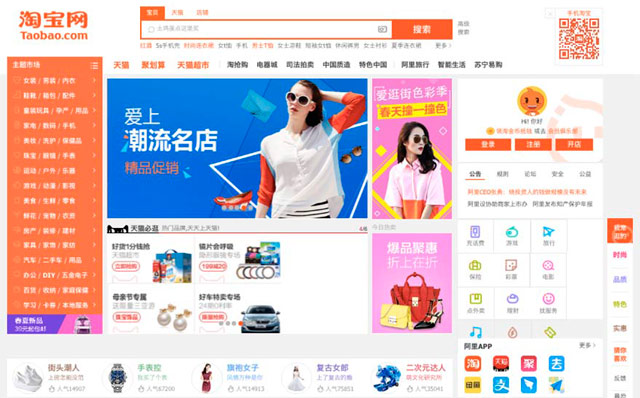
China Web Design Example – Taobao Home Page

Western Web Design Example – Ebay Home Page
Can you appreciate the difference in style, design, structure? I bet you do…
We can see a lot of information on Chinese site in contrast to the cleanliness and simplicity of the western site.
Our experience creating websites for the Chinese market has shown us some key points to understand and get advantage:
- Chinese websites use many more elements and are much more colorful than Western.
- Chinese language is different. It seems obvious… but there are things we have to consider about Chinese language such as:
- There is not a capital letter in Chinese
- There are no spaces between characters
- Chinese characters are far more dense than our letters
- Chinese sites use a lot of animation, flashing texts and banners. This is clearly the opposite to our western websites where movement is disappearing. The reason can be it’s much harder to grab attention using fonts in Chinese than it is with western languages.
2 – User experience… Do they have any good one?
We have just seen as websites in China seem much more complex than we are used to. We might think that the user experience will be a nightmare, but Chinese user is so accustomed to information under this structure as we are to the western structure.
Chinese user is concerned about usability and user experience, but is used to webpages so busy usually does not care how the site looks. However the trend is towards simplicity and clarity on web pages. In a more European style.
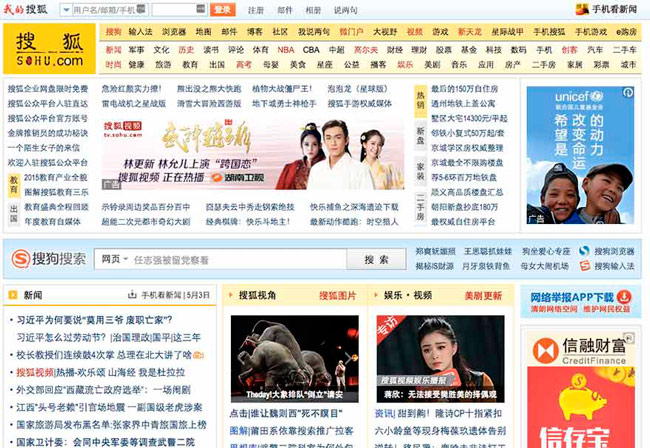
Where is (link) Wally?
Some of the highlights on Chinese websites regarding to navigation are:
- Chinese websites have a big number of links, however Chinese users do not like this system. This can be given by the low load speed internet in China.
- All this links use to open in other new windows. Why? Again it’s mainly an issue of speed. Internet access in China is generally slow, users have gotten used to opening new links while waiting for a page to load.
- Keyword search box as a navigate tool. Link system is not comfortable for users because they can be lost due to the big amount of links. For this reason, on Chinese websites keyword searches have to be really efficient, and the search bar must be top accessible.
3 – Hosting & ICP. DIstance matterS
The one who said that, in internet there is no distance, did not know about China. If you are not (legal and/or physical) in Mainland China, easy staff like finding the right hosting can became a little bit more complicated.
Let´s start from the beginning, one of the most common questions when we are going to create a China site is should we host our website within or outside China? Is there is a big difference? The answer is very clear, as far as possible we should try host the web in Chinese Mainland, and we will try to explain why.
China network structure is not the best, which makes the websites loading speed not the most appropriate. By hosting our web outside China this problem becomes much more serious.
Okay, so we are clear, we should host our website in China, now what? We must apply for a number of ICP (Internet Content Provider) to the Ministry of Industry and Information Technology of China. This is the ICP license that will allow our site to stay in Mainland China. Only companies with a physical presence in China can apply for this license (which usually see in the footer of the sites, as in our case).
For companies that do not have a legal entity in China, we do recommend looking for hosting solutions in Hong Kong, which can limit the problem of loading speed and make our site more accessible for the Chinese user.
Now that we talk about speed, even though the main problem affecting the same be the hosting (inside or outside) there are also other factors that can make our web go slower (and we have seen that it is a key point in China) as can be:
• Website images are not size optimized
• Poorly code in our website
• Low hosting quality (even inside Mainland China)
• Our site is using services blocked in China (Google Fonts, Google Maps, Twitter, Facebook, etc…) which prevents the page from loading
4 – Did you say… services blocked? … the Chinese Great Firewall
China not only has a huge physical walls to defend themselves (in the past). China also has a large digital wall, the Great Firewall. Originally known “Golden Shield Project” but ironically nicknamed Great Firewall, it is a censorship and surveillance project initiated by the Chinese Ministry of Public Security in 2003.
This project acts as a digital censor and block all websites that do not meet the content requirements that marks the Chinese government.
Here you can see some more information about how the censorship works.
Among other things, Chinese Internet censorship censored webpages that have content that include; news sources cover topics considered that are defamatory against China: such as police brutality, Tiananmen Square protests of 1989, freedom of speech, Taiwan Government, Dalai Lama or the Tibet Independence Movement International …
These sites are banned or are indexed to a lesser degree, if at all, by some Chinese search engines and have significant impact on search results.
As a result of this control in China they are blocked pages as usual for us as Google, Twitter or Facebook (it does no matter how much Mark go jogging in Tiananmen). Although great firewall control is easy to jump (using a VPN, for example) the difficulty of accessing these pages has made their use and popularity is low.
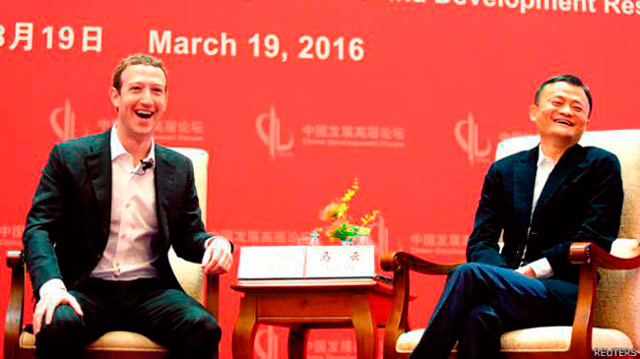
Stop laughing Mark. It´s not gonna happen
This means we need to be very careful with our website content, try to be sure to avoid Great Firewall content restrictions and not to use third party banned platforms like Google (Google Maps, Google Fonts), Facebook or Twitter.
5 – New Players & New Rules
So, no Facebook or twitter, how am I going to promote my website? China has a digital ecosystem different of everything we are use to. Surely you’re wondering how you survive without some of the usual promotional tools. Natural positioning in Google, PPC Adwords campaigns, promotion of content on social networks like Facebook or Twitter …
In China you will find new players who have occupied these gaps and in some cases, created new niches. These new players have taken advantage of the absence of foreign competition (Facebook, Google …), its adaptation to Chinese culture and peculiarity and in some cases even a strong government support.
These actors we found some “copycat“, certified copies of known systems, such as:
- Baidu, the Chinese search engine par excellence (suspiciously similar to Google)
- Weibo, the microblogging service (suspiiiiciouuusssslyyy similar to Twitter)
- Youku, video service (guess who it is similar?)
We also have WeChat, the jewel of the crown and the mobile app (almost an OS) that includes messaging, payments, calls, moments … and which we discussed in detail in another post.
For our website to be inside China digital life it must be adapted to the rules of these actors, common in the dailylife of the Chinese consumer.
So, who are the big guys that you need to be friend of?
As soldiers in a war, most of these tools fall into three large “armies”. These three groups are known as the BAT and are in constant battle to dominate the Chinese digital ecosystem.
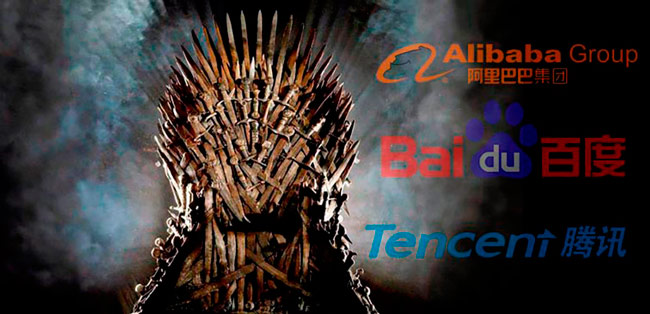
Who is going to win this war?
In short, Baidu holds commanding market share over search. Alibaba holds to the same power over e-commerce. Tencent is the dominant player in social media. But they are constantly trying to invade their territory, in a very interesting war for any fan marketing.
One of the commonalities of the BAT is a full support of the government, together with its dominant position in the market, makes this status quo is difficult to change.
What does it means for our website? We need to adapt our communication to this new players, generating our social media activity through Wechat, optimizing our SEO for Baidu or 360, uploading our videos in Youku, adding sharing actions in our content with Chinese social platforms… anything we use to do in our occidental site does not help us here and can be even negative for our goals. As we have seen, if we keep on using tools like Facebook (post sharing options for example) we can be blocked by the Great Firewall.
Do you want to know more? Sure? CHECK THE SECOND PART OF THIS POST HERE
References:
http://www.china-briefing.com/news/2015/05/22/best-practices-launching-china-website.html
https://econsultancy.com/blog/67466-why-do-chinese-websites-look-so-busy/
http://www.latmultilingual.com/build-localized-chinese-website/
Sources:
http://www.freepik.com/free-vector/screen-with-a-website-and-icons_847180.htm
http://www.freepik.es/vector-gratis/trabajador-llorando_834598.htm
7 Facts You Need to Know About The Chinese Online Market
1. The Chinese online ecosystem is shaped by the actions of the B.A.T.

The B.A.T. is a group consisting of Baidu, Alibaba and Tencent. They are the dominant players in the Chinese online ecosystem. The dynamics of their competition and cooperation defines the boundary and possibilities of digital marketing and ecommerce in China. Each member of the B.A.T. dominates important segments of the online ecosystem: Baidu dominates the search engine market; Tencent is strong in social media, and Alibaba fiercely rules ecommerce. The results of this competition can provide inconveniences for online marketers. Baidu, for instance, is reluctant to direct search traffic to Tmall stores and pages, where in some cases a company will need special permission from Baidu to promote Tmall stores using Baidu’s Search Engine Marketing (SEM).
2. Baidu’s dominance in the search market
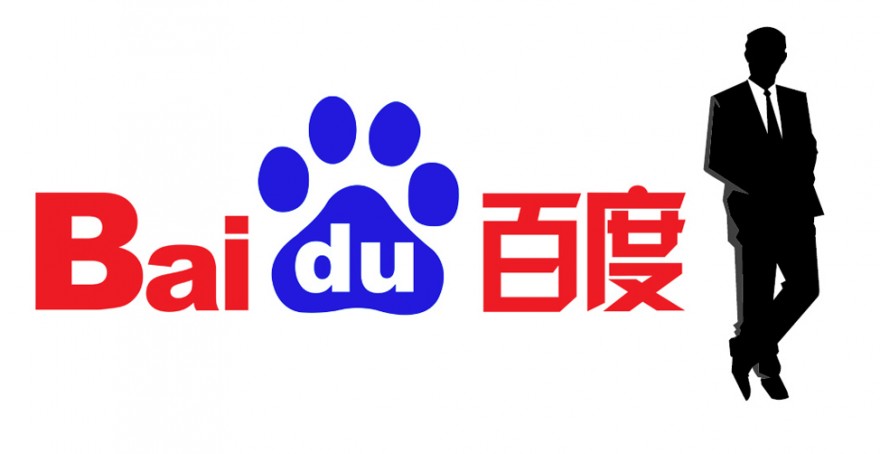
Baidu’s dominance in the Chinese search market means that most search engine related marketing activities requires the cooperation of Baidu to work. Baidu’s Search Engine Optimization (SEO) is different from Google’s SEO. Baidu still requires Meta data for proper indexing and it prioritizes loading speed quite heavily. Setting up SEM accounts with Baidu can either be an easy task that lasts for several working days or an excruciatingly slow and cumbersome process, which might take months to complete. This depends on the involved company’s policy match with Baidu’s requirements. There is also a minimum investment requirement for setting up an account. These can range from as low as 6,000 RMB to as much as 500,000 RMB depending on the type of account that is being opened. One of the most important aspects of Baidu’s listing is the absence of brand protection. This means that brand keywords can be bought by any paying parties willing to buy them. This might lead to unfair price based competition between official suppliers and the unofficial ones, or even from someone that sells fake products through proper channels.
3. Wechat is not just a messaging app; it is a lifestyle app that defines online interaction in China

It is hard not to know about Whatsapp, Facebook, Twitter or Instagram in 2016, yet many are not familiar with Wechat if they live outside of China. Many foreigners regard Wechat as a Chinese version of Whatsapp but it is far from just a messaging app. To be more precise, Wechat combines the function of many known social media sites and utility apps. Users can chat, post their photos, sell items, make online payments, book a ride, buy transportation tickets, invest their money, and more. In addition to being used as a private app, it’s becoming more and more popular in the work place, mainly used for communications. With so many diverse functions and over 600 million registered users, marketers naturally want to use Wechat as a channel to communicate to their target audience. Wechat offers the possibility of a one on one customer service; creating customized functions to improve the brand experience. However, with the Wechat craze comes the high costs of Wechat marketing. Posting merketing content on a big account with upwards of 100,000 followers can cost as much as 80,000 RMB.
4. The Chinese consumer has embraced ecommerce faster than most markets

The rise of ecommerce in China surprised many outside observers. Many consumers born in the 80’s and 90’s have fully embraced the concept of ecommerce as the main way to purchase items. Anything from daily necessities to premium products can be purchased. The Chinese consumer responds well to online promotions and acceptance of new brands, however, most of them are still price sensitive. Foreign brands selling in the Chinese market to the Chinese consumer are less likely to be successful offline due to the high cost of real estate. Platforms such as Tmall and Jing Dong and vertical e-store are the best way to sell to consumers in China. Ecommerce events such as 11.11 are already a cultural phenomenon in China where the total transactions can be above 11 billion USD in one day.
5. China has one of the most highly regulated online environments in the world

China is one of the fastest growing online markets yet it is one of the most regulated ones. Traffic data going in and out of the country is heavily censored and is significantly slower than domestic traffic. This means that local hosting might be necessary for optimum speed. To publish a website, a company is required to obtain the Internet Content Provider (ICP) license to publish any content online. China has a very strict advertising law. Multinationals are regularly hit with fines for violating the law and some fines can go up to 100 million RMB. It is critical to study the proper regulations and laws before entering the Chinese market to prevent future risks and losses.
6. Mobile is not the future; it’s already the dominant traffic in China
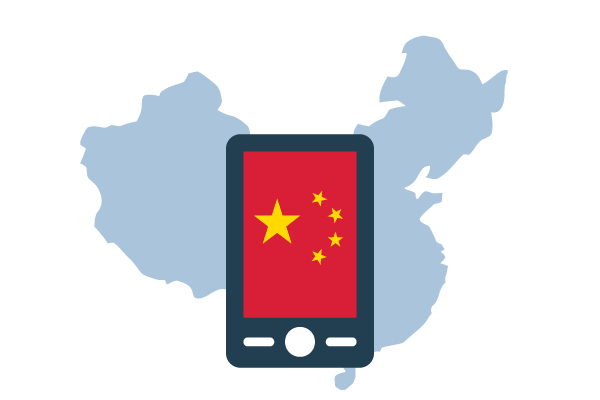 In recent years, PC traffic has been decreasing 15% every year, whereas mobile traffic has been increasing as much as 20% in the same time frame. Many online retailers are reporting that most buyers are using their mobile phones to buy items online. Conversion for mobile traffic is also higher than PC traffic in many cases. This is due to the high penetration rate of smartphones as well as user reliance on mobile devices for online payments. It is easier for users to pay online with mobile phones than it is with their PC. Traditionally, consumers would use their PC to do extensive research before buying online. However, with improved mobile connectivity and mobile optimized websites, many consumers are abandoning PC and in some cases only uses PC for work related activities. The pay-per-click for mobile traffic can create as much as 300% higher than PC traffic in some industries, mainly due to limited advertising space and high demand.
In recent years, PC traffic has been decreasing 15% every year, whereas mobile traffic has been increasing as much as 20% in the same time frame. Many online retailers are reporting that most buyers are using their mobile phones to buy items online. Conversion for mobile traffic is also higher than PC traffic in many cases. This is due to the high penetration rate of smartphones as well as user reliance on mobile devices for online payments. It is easier for users to pay online with mobile phones than it is with their PC. Traditionally, consumers would use their PC to do extensive research before buying online. However, with improved mobile connectivity and mobile optimized websites, many consumers are abandoning PC and in some cases only uses PC for work related activities. The pay-per-click for mobile traffic can create as much as 300% higher than PC traffic in some industries, mainly due to limited advertising space and high demand.
7. Local content through local perspective

The Chinese market is still flooded with marketing contents that are just a direct translation from their original language. Some branding videos of multinational companies do not have Chinese voice-overs, only Chinese subtitles. While these contents do not necessarily fail to communicate their intended message, most have drastically reduced their effectiveness and recall rate due to being less relevant. In order to communicate effectively, companies need to dig deep to find relevant messages and hire local content producers as a bridge to effectively communicate to their Chinese consumers. This is especially relevant when publishing materials online, where the Chinese consumer expects instant gratification, not a bad translation.
This article was edited by Andres Arroyo Olson from 2Open.
General situation of fake products in China
It is common knowledge that fake products are everywhere in China, from large cities like Shanghai to remote small towns in Western China and, not surprisingly, online markets are not the exception, even though there is a lack of acknowledgment from their part, it seems that fake products are a part of China whether we like it or not.
The online market giant Alibaba group was sued in the U.S. regarding fake products regulations. According to Jack Ma, the founder of Alibaba, his company spends over one hundred million RMB each year on actions against counterfeit goods. The situation has improved considerately over the past few years, some shops have even been closed down due to this sort of issues. 2Open, as a company who deals everyday with marketing and e-commerce, is used to supervise online sales in China for many clients and the number of shops selling a certain brand with an unbelievably lower price has decreased noticeably in comparison with last year. There is still a lot of work to do, but exactly what types of products are more likely to be faked?

SHENZHEN, CHINA – AUGUST 04: (CHINA OUT) Police officers deal with fake brand-name items at a shop on August 4, 2014 in Shenzhen, China. Shenzhen police seized a large number of fake brand-name items, like Hermes, Gucci, Rolex, Chanel, Prada, Miumiu, and so on, worth 5,000,000 yuan (810,000 USD). (Photo by ChinaFotoPress/ChinaFotoPress via Getty Images)
The most common faked goods are well-known brands, such as Nike, Adidas, Louis Vuitton, Gucci, etc. If a new brand wants to enter China, it will seldom encounter issues regarding fake products. In this situation, just a small budget is needed for online marketing which could be used for setting up a shop on www.taobao.com, putting online Ads or even buying key words on search engines, all of which can have a positive effect and lead buyers to get to know your brand. Since you are the shop owner and the only supplier at this moment, the buyer will come to you directly; no other shops will take potential buyers from you.
Let us say your brand successfully entered the Chinese market, perhaps one day someone will start faking and selling your products, but how would this affect your brand? Some argue that this is just indicator of the success and popularity that your product has had in the Chinese market and that there are no reasons to be worried. Experts agree that there is plenty of space in the market for both parties; a lot of people prefer to buy original products for a higher price than fake ones for a lower one. Counterfeiting could be considered a promotion activity for a brand, after all, if you are confident about your products, put money into marketing, let people know about it, you will get money back, no doubts about it, but how is the future looking for fake goods?
According to Xinhuanet, the General Administration of Quality Supervision, Inspection and Quarantine (AQSIQ) has gathered around four giant e-commerce platforms: Alibaba, Jingdong, Suning, Yihaodian to sign a cooperation agreement which will help to release inspection results of the fulfillment of product quality commitment. AQSIQ has developed a search platform of inspection of product quality, which will be put online for public use around March 15, 2016.

Fake products problems continue to plague the development of e-commerce. Jingdong and Alibaba have been fighting a war these days, accusing each other of not making efforts to end the fake goods. The offline scene does not look very bright either, street shops are now going through a rough time these days, people are getting used to purchase everything online, from groceries to electronics, during the singles day alone (Nov. 11, 2015) Taobao reached a sales volume of 91,217,017,615 RMB.
It is an Internet Era, no doubt about it, and counterfeit goods should not represent any obstacle if one should intent entering the Chinese market. A smart digital marketing strategy, like the one 2Open offers, can get your brand the recognition it deserves.
Let us know what you think in the comments below.
This article was edited by Andres Arroyo from 2Open.
Trends turning into essential tools, outlook 2015
Every year we deal with the trends of the upcoming’s season just to make sure we are up-to-date. We are looking forward for the iPhone 6 introduction; we can’t wait for the new Michael Kors bag-collection; we have to be among the first who try out the pop-up restaurant in town. Sometimes the latest trend catches us like fire and sometimes we rather wait to see if a trend establishes (and secretly hope it doesn’t). But why do trends have such an enormous impact on us? On society? There are a few possible reasons. One could be, that we want to belong to a group – preferably the popular one. We want to sit with them. We want to be belong the “the cool” ones.

Another reason might be that evolution requires change. Without the need for changes there would be no development and we would not be where we are today.
Last year it was trendy to implement content marketing instead of the usual branded commercials and to use storytelling as a part of it. Next year though, content marketing will be essential. Due to the information overload which consumers need to face these days, we need to reduce complexity of our information. Stories and visual content (images, videos etc.) are more likely to be remembered and raise emotions which allow a brand to bond with the costumer. In this context, brands grow more and more into the role of a publisher where they have to prove empathy. It is necessary to show the costumers we actually care and shift the focus from sales to dual and more human communication.

Another example for former trends which turned into fundamental tools is mobile marketing. Today having an APP or at least providing a mobile optimized website is a must have. But noticing that mobile is the most important channel and daily life instrument especially in China and to use the data which mobile provides and to redefine the strategy upon this data is smart. By analyzing your target group and finding out new insights, and growing a community around your brand will make your digital marketing strategy much more effective.
The digital marketing trends for 2015 are not ground breaking but yet very important – trends turn into essential tools which are going to be expanded and developed. I believe that the trends 2015 show pretty clear that the digital world is changing and that we have to adapt our strategies. Social Networking, Email Marketing, SEO and Mobile Marketing are gaining constant importance, although you should see these tools more like your little black dress which you can tune up with a statement necklace. Don’t follow trends just to belong to “one of them”. Analyze trends to embrace your potential and let the change make you grow into someone you never believed you could be.
Changes lead to growth.
The world doesn’t stop moving, neither should you.
Written by: Melani Nikolic










